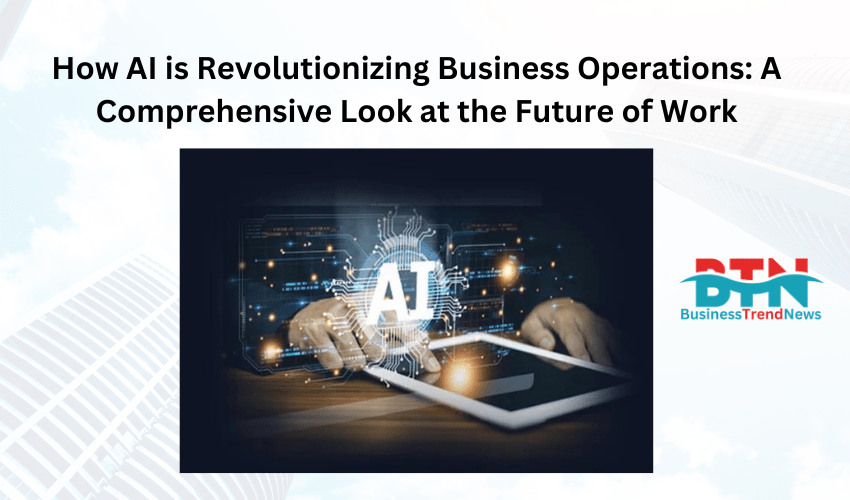![]()
How AI is Revolutionizing Business Operations: A Comprehensive Look at the Future of Work
Artificial Intelligence (AI) is no longer a futuristic concept—it’s here, reshaping industries, enhancing business operations, and transforming the way organizations work. From automating routine tasks to enabling more sophisticated decision-making, AI is a powerful tool driving business innovation. In this comprehensive guide, we’ll explore how AI is revolutionizing business operations, discuss the most impactful use cases across various industries, and examine how AI is setting the stage for the future of work.
Table of Contents:
- Introduction to AI in Business
- AI in Automating Routine Tasks
- AI in Enhancing Decision-Making
- AI-Powered Customer Service
- AI in Marketing and Sales Automation
- AI for Supply Chain and Logistics Optimization
- AI in Human Resources and Recruitment
- AI in Financial Operations
- AI in Product Development and Innovation
- The Future of AI in Business Operations
- Challenges and Considerations
- Conclusion
1. Introduction to AI in Business
AI has become an integral part of modern business strategies. It enables machines to mimic human intelligence and perform tasks that usually require human intervention, such as learning, reasoning, and problem-solving. As businesses strive for greater efficiency, AI offers the ability to streamline processes, enhance productivity, and reduce operational costs.
According to a McKinsey report, AI adoption in businesses has increased significantly, with companies in various sectors investing in AI technologies to stay competitive. This widespread adoption is not just confined to tech giants like Google, Amazon, and Microsoft—small and medium-sized enterprises are also embracing AI to improve efficiency.
2. AI in Automating Routine Tasks
One of the most noticeable ways AI is revolutionizing business operations is through automation. AI-powered systems can handle repetitive and mundane tasks with incredible speed and accuracy, freeing up human employees to focus on more strategic activities.
Use Cases of Automation:
- Data Entry and Processing: AI algorithms can manage vast amounts of data, ensuring faster processing times and minimizing human error.
- Chatbots: AI-powered chatbots are transforming customer service by providing real-time responses to customer inquiries, managing multiple conversations at once, and operating 24/7.
- Email Sorting and Management: AI tools like Google’s Priority Inbox use machine learning to sort emails based on importance, making it easier for users to focus on critical communications.
By automating routine tasks, businesses can save time, reduce human error, and allocate resources more efficiently.
3. AI in Enhancing Decision-Making
AI-driven analytics and machine learning algorithms help businesses make better, data-driven decisions. These technologies allow organizations to sift through large datasets to identify patterns, trends, and insights that were previously impossible or too time-consuming to uncover.
Examples of AI in Decision-Making:
- Predictive Analytics: AI systems can analyze historical data and make predictions about future trends, enabling companies to make informed decisions regarding marketing strategies, inventory management, and sales forecasting.
- Risk Management: In industries like finance and insurance, AI is used to assess risks by analyzing various factors in real-time. For instance, AI models can predict credit risk, fraud detection, or market volatility, improving decision-making in high-stakes situations.
- Business Intelligence: AI-powered business intelligence tools like Microsoft Power BI and Tableau can analyze real-time data to provide actionable insights that can drive strategic decisions.
With AI, businesses can make smarter, faster, and more accurate decisions, giving them a competitive edge in the market.
4. AI-Powered Customer Service
Customer service is a critical area where AI is making significant strides. AI-powered chatbots and virtual assistants are now able to handle a wide range of customer interactions, from answering FAQs to troubleshooting product issues.
Key Benefits of AI in Customer Service:
- 24/7 Availability: AI chatbots work around the clock, ensuring that customers receive immediate assistance no matter the time of day.
- Cost Efficiency: By automating customer service, companies can reduce the need for large support teams, cutting operational costs.
- Personalization: AI systems can analyze customer data to provide personalized responses and recommendations, enhancing the overall customer experience.
For example, companies like Amazon and Sephora use AI-driven customer service tools to streamline the buying process, offer personalized product recommendations, and improve customer satisfaction.
5. AI in Marketing and Sales Automation
AI has transformed how businesses approach marketing and sales by automating processes, personalizing content, and analyzing customer behavior. AI-driven tools are helping businesses optimize their marketing strategies and improve sales outcomes.
Use Cases in Marketing and Sales:
- Customer Segmentation: AI systems can analyze customer data to identify distinct segments based on purchasing behavior, preferences, and demographics. This allows marketers to deliver highly targeted campaigns.
- Content Personalization: AI tools can curate personalized content for users based on their previous interactions and preferences, improving engagement and conversion rates.
- Lead Scoring: AI algorithms can rank leads based on their likelihood of converting, enabling sales teams to prioritize high-value prospects and close deals more efficiently.
Tools like HubSpot, Salesforce, and Marketo leverage AI to automate email marketing campaigns, optimize ad spending, and boost sales productivity.
6. AI for Supply Chain and Logistics Optimization
AI has also revolutionized supply chain management and logistics by enabling real-time data analysis and predictive analytics, leading to more efficient operations and reduced costs.
AI Applications in Supply Chain:
- Demand Forecasting: AI algorithms can predict future demand based on historical data, seasonal trends, and market conditions. This helps businesses optimize inventory levels and reduce waste.
- Route Optimization: AI-driven route planning tools help logistics companies identify the most efficient delivery routes, reducing transportation costs and improving delivery times.
- Warehouse Automation: AI-powered robots and drones are used in warehouses to automate tasks such as sorting, picking, and packing, leading to faster and more accurate order fulfillment.
Companies like UPS, Amazon, and FedEx are using AI-driven technologies to streamline logistics and improve overall supply chain efficiency.
7. AI in Human Resources and Recruitment
AI is playing a pivotal role in transforming HR operations and recruitment processes. From talent acquisition to employee management, AI-powered tools are making HR departments more efficient and data-driven.
AI in HR Use Cases:
- Automated Screening: AI recruitment tools can sift through resumes and shortlist candidates based on predefined criteria, reducing the time and effort spent on manual screening.
- Employee Engagement: AI-driven sentiment analysis tools can gauge employee satisfaction by analyzing feedback and identifying areas for improvement.
- Performance Evaluation: AI systems can monitor employee performance based on key metrics, providing data-driven insights to improve productivity.
Platforms like Workday, BambooHR, and Lever use AI to streamline HR functions, improve hiring outcomes, and enhance employee engagement.
8. AI in Financial Operations
In the finance sector, AI is transforming various aspects of financial operations, from managing risk to enhancing fraud detection and optimizing trading strategies.
AI Applications in Finance:
- Fraud Detection: AI algorithms can analyze transactional data in real-time to identify potentially fraudulent activities, helping businesses prevent financial losses.
- Algorithmic Trading: AI-driven trading platforms can execute trades based on predefined rules and real-time market data, optimizing investment strategies.
- Expense Management: AI tools like Expensify and Concur help businesses manage expenses by automating receipt scanning, categorization, and reporting.
By automating financial processes, AI is helping businesses reduce errors, improve accuracy, and increase operational efficiency.
9. AI in Product Development and Innovation
AI is enabling businesses to speed up product development and drive innovation by automating research, prototyping, and testing processes. With AI, companies can reduce the time-to-market for new products and ensure that they meet customer needs.
AI Use Cases in Product Development:
- Predictive Design: AI systems can analyze customer preferences and feedback to predict which product features will be most successful, helping businesses make more informed design choices.
- Rapid Prototyping: AI-driven 3D printing technologies allow businesses to quickly create and test prototypes, reducing development time.
- Quality Assurance: AI-powered tools can automate testing and quality control processes, ensuring that products meet the required standards.
Companies like Tesla and Apple are leveraging AI to innovate faster and bring cutting-edge products to market.
10. The Future of AI in Business Operations
The potential for AI to transform business operations is limitless. In the future, we can expect AI to play an even greater role in automating complex tasks, enhancing decision-making, and driving innovation across industries.
Emerging AI Trends:
- AI and IoT Integration: The combination of AI and the Internet of Things (IoT) will enable businesses to collect and analyze data from connected devices, improving decision-making and operational efficiency.
- AI-Driven Innovation: As AI technologies continue to evolve, businesses will be able to leverage AI to drive innovation in areas like product development, customer engagement, and supply chain optimization.
- AI and Augmented Reality: The integration of AI and AR could revolutionize industries like retail, healthcare, and manufacturing, creating new ways for businesses to interact with customers and improve operations.
The future of AI in business is bright, and those who embrace these technologies will be well-positioned for success in the coming years.
11. Challenges and Considerations
While AI offers numerous benefits, there are also challenges that businesses need to consider when implementing AI technologies.
Key Challenges:
- Data Privacy: AI systems require access to vast amounts of data, raising concerns about data privacy and security.
- Workforce Displacement: As AI automates tasks, there is the potential for job displacement, particularly in industries reliant on manual labor.
- Cost of Implementation: While AI can provide long-term benefits, the initial cost of implementing AI technologies can be high, particularly for small businesses.
Despite these challenges, the benefits of AI in revolutionizing business operations far outweigh the drawbacks. With proper planning and consideration, businesses can harness the power of AI to achieve their goals.
12. Conclusion
AI is undeniably transforming business operations across industries. By automating routine tasks, enhancing decision-making, and enabling new innovations, AI is reshaping how businesses function. As AI technologies continue to evolve, companies that embrace these tools will not only improve efficiency and productivity but also gain a significant competitive edge in the marketplace. Whether you’re a small startup or a large enterprise, the integration of AI into your business operations can unlock new opportunities for growth and success.



